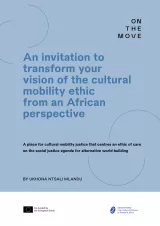A place for cultural mobility justice that centres an ethic of care on the social justice agenda for alternative world building.
This publication is not the usual kind co-produced by On the Move. This is not a guide; it is not an advocacy paper nor a piece of academic research.
What Ukhona Ntsali Mlandu offers us instead is an invitation in response to an invitation of our own. The process began when Ukhona was invited to write a document addressing the issue of cultural mobility in an African context – as while many studies exist on the topic of cultural mobility these relate more closely to a European context.
From the original commission and brief: ‘This research is expected to focus on definitions and motivations behind mobility patterns in Africa while referring to mobility funding schemes and practices not “under the radar” in an African context, as well as to approach the complexities linked to visa processes or refusals between Africa and Europe.’
This invitation was answered by another kind of invitation from Ukhona – an invitation to change our mindsets, particularly for those of us in the more privileged Global North, and to transform our ideas and assumptions about the reality of cultural mobility when rooted in an African context.
Ukhona’s invitation can be read as a protest, as a reflection, as a manifesto, and above all as a real attempt to shift our understanding of the human, economic, political, societal and environmental realties that underly the idea of a more ethical mobility for artists and culture professionals, and to place at the core of this idea the notions of solidarity, care, hospitality, and mobility justice.
You may be challenged by the format of this document, but this is a crucial part of it. This invitation to transformation does not have to be read in a linear way or in one sitting. Instead you can use it as a reference, as a basis for discussion by taking its definitions and points into your own programmes and schemes, or as a catalyst for an unlearning process that challenges your assumptions.
This publication is supported under the Deconfining project. This EU co-funded initiative aims to create improved and fairer cultural ties between Europe and Africa by developing a sustainable reference model of cooperation that will later be extended to other regions of the world. This invitation to transformation can be seen as a less formal, more personal piece of writing to complement this reference model of cooperation.
Ukhona’s writing complements an initial, data-led advocacy report focused on Schengen visas and the practical obstacles faced by artists and culture professionals in Africa.
